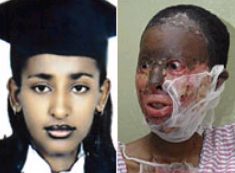FEATURE-Ethiopia acid victim shows many women are at risk
March 27, 2007 (ADDIS ABABA) — Kamilat Mehdi was walking home after dark with her two sisters when a man stepped out of the shadows and threw sulphuric acid in her face.
 The acid hit the 21-year-old’s eyes, nose, mouth, forehead and chest, splashing onto the faces and backs of her sisters beside her, burning flesh wherever it touched.
The acid hit the 21-year-old’s eyes, nose, mouth, forehead and chest, splashing onto the faces and backs of her sisters beside her, burning flesh wherever it touched.
Though an isolated case, the attack has horrified Ethiopia’s reserved and conservative society and cast a searing light on a hidden culture of violence against women.
“This isn’t just a crime against Kamilat,” said Assefa Kesito, Ethiopia’s minister of justice, who visited her bedside.
“This is a crime committed against the state of Ethiopia. A crime committed against my daughter, my sister, my mother.”
The attack — allegedly by a man who had been stalking Kamilat — came amid recent advances for women’s rights in Ethiopia. But official improvements are just part of the story.
A 2005 report by the World Health Organization found just over 70 per cent of Ethiopian women surveyed who had ever been in a relationship had suffered some sort of physical or sexual violence. Sixty-five per cent said it was acceptable to beat a wife for not finishing her housework.
Dr Elaine Rocha, a professor at Addis Ababa University’s Institute of Gender Studies, said this was the first acid attack she had come across in Ethiopia, but added it fits a pattern of violence against women in the country.
“It is only the most extreme cases like this that ever come out into the open,” she added. “A woman is taught to tolerate abuse from a very, very early age. We could be talking about beating, abduction, harmful traditional practices like genital mutilation. The only time she might talk about it is when her life is at risk.”
Kamilat is now being treated in a specialist hospital in Paris, France — sent there by the country’s richest man, entrepreneur Sheikh Mohammed Al-Amoudi, who stepped in to pay for her treatment amid reports her life may be in danger.
“It’s hard because every day they do something, and there’s no anesthetic,” she told Reuters at the Addis Ababa hospital where she was treated before being moved to France.
RISING TREND?
Acid attacks against women have been recorded in Bangladesh, Cambodia, Sri Lanka, India, three cities in Britain and Uganda, according to the British charity Women at Risk. Some people fear they may be on the rise.
Ethiopia has made significant advances to protect women’s rights in recent years: it has its first Minister of Women’s Affairs and overhauled legislation on rape, female genital mutilation and other offences.
“There have been big advances. But there is still a problem with enforcing these new laws,” said Mahdere Paulos, executive head of the Ethiopian Women Lawyers Association.
Mahdere said improvements depend on training police officers and changing female self-perceptions: “They would always see the man or the husband as a father who has a right to discipline his wife like he would discipline a child. It is the culture.”
Research suggests acid attacks can happen when a woman either ends a relationship or rejects a suitor, said Marren Akatsa-Bukachi, executive director of the Kampala-based East African Sub-regional Support Initiative for the Advancement of Women, adding that such attacks are quite common in Uganda.
“I’ve been there two and a half years and I have come across more than 10 cases,” she said at a conference on domestic violence in Addis Ababa.
“It seems to be a growing trend. They come and knock on your door, or say ‘Let’s meet to talk this over’. Then they put acid on your face. They are so bitter. They are thinking ‘If I can’t have you then no one can.’
“In East Africa we are patriarchal and that means that women are more or less invisible. In many traditions a sign of love was an occasional slap to your wife. And the wives who were not slapped used to complain to their friends,” she said.
STALKER?
Kamilat and her sisters were attacked on January 6: her story only hit headlines after her family decided to go public about it to raise funds for her treatment.
The acid burned almost all the skin from Kamilat’s face, scorched off an inch of her hairline and destroyed most of her eyelids. She has to wear a bandage to go to sleep.
National television appealed for donations and gave regular updates on her condition. Star athlete Haile Gebreselassie queued with government ministers to visit her bedside.
“It has taken her this long to gather up the courage to tell everyone about it,” family friend Yemenesh Negash said.
“She is very strong. She has big dreams – she’s a visionary. She wants everyone to know what happened.”
Yemenesh said Kamilat had recognized her attacker as a man who had obsessively stalked her for the past four years.
“He used to follow her around, then phone her and say ‘I can see you drinking coffee,”‘ said Yemenesh. “He would threaten her, her family. One time he gave her a bag and said there was an explosive in it.
“She went to the police but they said she needed witnesses.”
Two Ethiopian men appeared in an Addis Ababa court on Sunday, one charged with the attempted murder of Kamilat Mehdi and causing her grievous bodily injury. The other was not charged at the hearing. The case was adjourned.
(Reuters)
